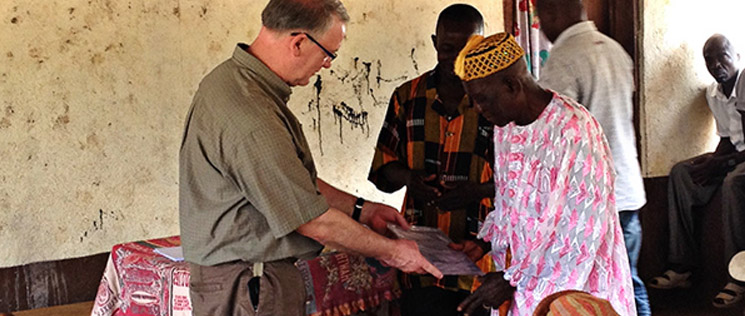
Village Partnerships: Bombali Bana

Partner: Central Wesleyan Church (Holland, MI)
Population: 961
Households: 123
Status: Completed
Location: Bombali District, Sierra Leone
GPS Coordinates: N08 57.571 W012 02.037
Village History
In Bombali Bana, the majority of villagers are farmers surrounded by vast land suitable for rice, cassava, beans and groundnut cultivation and the rearing of domestic animals. Traditionally farmers save seeds for next year’s planting, but the people of Bombali Bana endured “hungry months” during the dry season as they did not have enough seeds to produce staple crops, including rice and peanuts, to last all year.
Bombali Bana also lacked a safe, year-round water supply, which forced people to consume contaminated water from a nearby pond and running stream. This caused diarrhea, dehydration and even death, especially among young children. A lack of sanitation facilities in the form of ventilated pit toilets, as well as a lack of knowledge about how disease is spread led to poor hygiene and, consequently, the spread of preventable illness.
Prior to any World Hope International involvement in Bombali Bana, the village was in desperate need of a clean and safe water supply, improved education, leadership development and greater food security.
Completed Activities & Impact
Clean Water Wells and Sanitation
A new borehole well has brought a consistent source of clean, year-round water, a welcome reprieve from the previously existing hand-dug well. Before, the hand-dug well would dry up at the peak of the dry season and force villagers to use water from a contaminated source for 2-4 months per year. This left the community vulnerable to preventable water-borne disease. Now, villagers can drink and wash, year-round, without fear of sickness.
Economic Development
WHI worked the village to form and train a Village Development Committee (VDC). Community members elected trustworthy people of good reputation to serve on the VDC, including religious leaders, chiefs, head farmers and women. The VDC works with WHI to encourage participation in development activities, steward project resources and hold their community accountable. The committee strategizes about future development planning and discusses solutions to current problems, acting as the primary change agent in the village through collective action.
Agriculture
With WHI’s support, farmers learned to prepare, plant, harvest, maintain and store crops in order to produce the highest yield that lasts year-round. Farmers also received business training, to learn to manage their resources and save for the future.
Most recently, WHI provided nine much needed bags of fertilizer to take care of the approximately 37,798 pineapple suckers that have been planted across approximately 1.5 acres. In addition, WHI provided 10 shovels, five wheel barrows, 21 cutlasses, 10 hoes, 10 hand gloves, five pick axes, six garden lines, two rakes, 20 rain coats and 20 rain boots.
In order to maintain a stable year-round income, it is also important that farmers raise different types of animals – such as goats and chicks - that can survive drought periods, are easy to manage, and hardy.
Goats are ideal because not only can goats survive in harsh conditions, but they also reproduce faster than other livestock and there is a strong market for goat meat. WHI helped villagers with goat procurement and production, which is important to improving food security in rural communities.
For chicks, families were also assisted in constructing poultry houses and chicks were distributed. This improved breed of chick lays more eggs, providing for better nutrition and yielding surplus eggs for sale. The income gained from the sale of eggs is used for livelihood support and to pay school fees for children. More eggs also means more protein in the diet of village children, an important component in physical and mental development.
Education
Village teachers were initially paid from community members’ contributions, but payments were erratic because the parents were so poor. As a result, teachers had to do other work to make ends meet, which often conflicted with the school schedule. WHI provided a small stipend to increase teacher incentive and attendance. This initiative has added to the effectiveness school system as teachers are regularly available for class attendance.
In addition, to ensure the continuation of effective childhood education, a brand new Teachers’ Quarters was built in November 2012. This building enables community teachers to reside close to the primary school, allowing teachers to have more time to focus and invest in their role as educators.
Health and Nutrition
Malaria poses a constant threat to the people of Bombali Bana. Mosquitos that carry the disease are most active at night. By sleeping under an insecticide treated bed net, the risk of contracting malaria is reduced. Mosquito nets were distributed to every household with children under five years of age or a pregnant woman. The nets are accompanied by awareness and prevention training, which motivates families to use the nets for maximum health benefit.
Moreover, soap is distributed to families, complemented by instructions to wash hands after using the toilet and before eating. Demonstrations are conducted on effective hand washing techniques and village members are trained in the proper disposal of human waste. A monthly cleaning schedule is created as a constant reminder to the community. These measures have a broad impact in the village and improve the health of all.